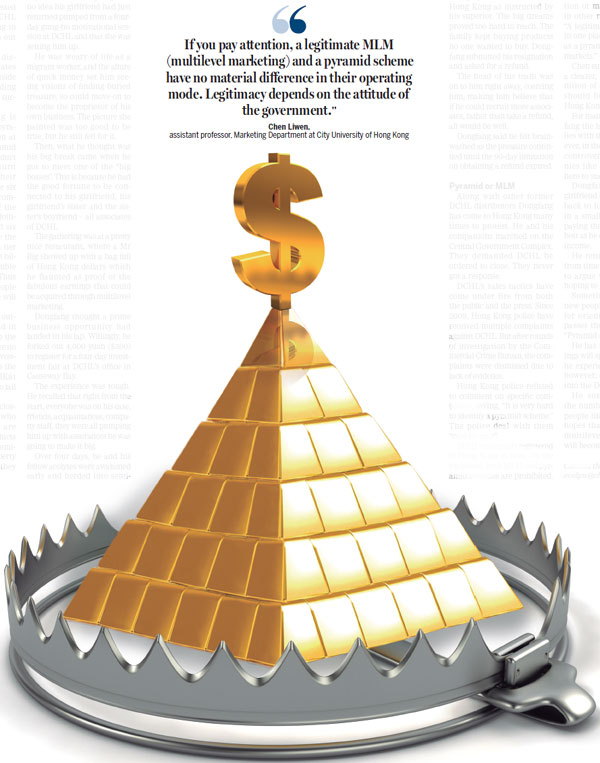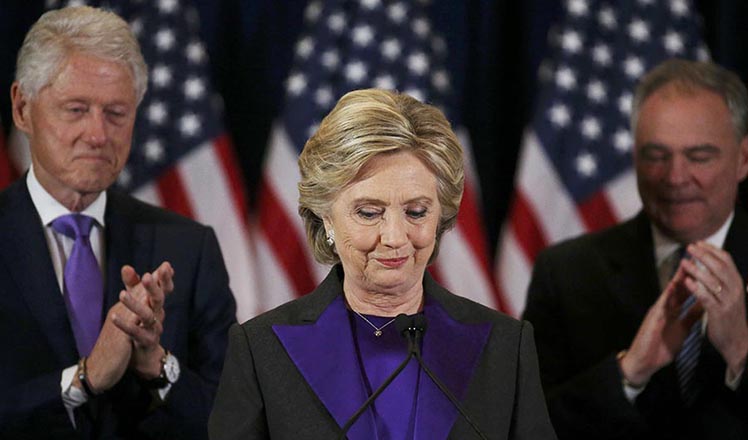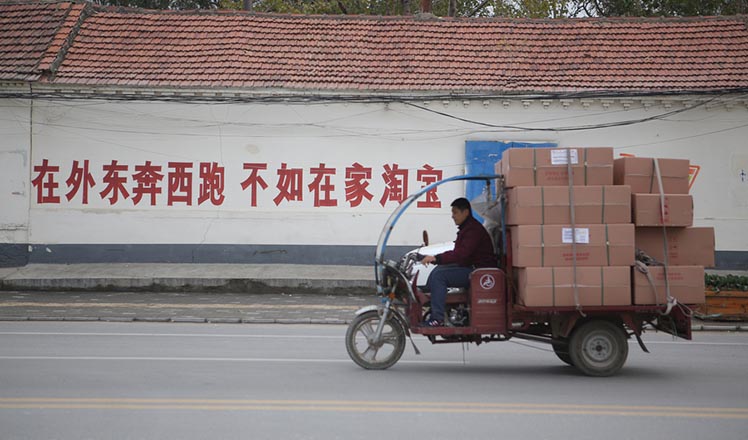A race to the bottom
Updated: 2016-11-11 15:07
By Evelyn Yu(China Daily USA)
|
|||||||||

Evelyn Yu explores the murky world of multilevel marketing and explains the heavy social price paid by people who get too heavily involved in it.
Mandarin-speaking tourists can frequently be seen making their way through the Friday afternoon chaos of Causeway Bay, pushing on toward Sogo department store, trundling their luggage along the sidewalk behind.
They are not shoppers. They are people determined to get rich, so they gather at the office tower adjacent to Sogo, chattering excitedly, eager to be heading back home, luggage packed with purchases of scented lamps, wines, liqueurs, jewelry and other magical implements capable of transforming base metal into gold.
Happily they jostle their way into an elevator for the ride that will take them to the 14th floor offices of Digital Crown Holdings Limited (DCHL), a controversial Hong Kong-based multilevel marketing (MLM) company.
The company has made itself the target of protests that have sprung up outside its offices, even outside the Legislative Council by angry mainland people demanding DCHL be put out of business.
The company is not even permitted to do business on the mainland, rejected as a pyramid scheme. Hundreds of its agents have been arrested by mainland police. DCHL also had a brief flowering in Macao, before being run out of town in 2008.
Frequently enough, disgruntled former associates turn up on the streets outside company offices demanding their money back. Some succeed. Most do not.
Multilevel marketing is almost identical to old pyramid schemes. The person at the top of the sales pyramid recruits, let's say, six product "distributors" who return him a percentage of their product sales. Each of the six also recruits six more, comprising the third tier of the pyramid. If each person joining the scheme recruited six more people, by the time the pyramid reached its 13th tier it would comprise over 13 billion people - almost double the world's population. Thus the great majority of people who invest in the scheme will lose their money.
Pyramid schemes are outlawed in Hong Kong and in most other places because the majority of investors receive no material value for their investment. A person who breaks the law in Hong Kong faces a HK$1 million fine and could go to jail for seven years.
Multilevel marketing closes this loophole. People who join the MLM pyramid are required to purchase products from the company at premium prices. They are at liberty to retail the products if they choose.
MLM's defenders say this is a form of direct marketing cutting out bricks and mortar stores. But the mathematics of the game remains the same. Most are left with only a surfeit of overpriced goods they can neither sell, nor consume.
There are commissions and bonuses available, but experience shows only those who get in early can make an actual profit.
In Hong Kong, the boundary between permissible multilevel marketing and pyramid schemes is blurred. This creates loopholes that seem to turn many eager investors into disappointed victims.
Mainland victims
One of those victims is "Dongfang", a former DCHL affiliate, who claims he was cheated out of more than 200,000 yuan (about HK$230,000). He is one of those frequently seen protesting outside the DCHL offices.
Dongfang was a technician at a factory in Shenzhen before he joined DCHL. He was earning some 2,000 yuan a month, but had big dreams. He took his first steps down the road to ruin back in 2012. His girlfriend at the time regaled him with accounts of her older sister earning a fortune selling red wine. Dongfang had no idea his girlfriend had just returned pumped from a four-day gung-ho motivational session at DCHL and that she was setting him up.
He was weary of life as a migrant worker, and the allure of quick money set him seeing visions of finding buried treasure, so could move on to become the proprietor of his own business. The picture she painted was too good to be true, but he still fell for it.
Then, what he thought was his big break came when he got to meet one of the "big bosses". This is because he had the good fortune to be connected to his girlfriend, his girlfriend's sister and the sister's boyfriend - all associates of DCHL
The gathering was at a pretty nice restaurant, where a Mr Big showed up with a bag full of Hong Kong dollars which he flaunted as proof of the fabulous earnings that could be acquired through multilevel marketing.
Dongfang thought a prime business opportunity had landed in his lap. Willingly, he forked out 4,000 yuan ($590) to register for a four-day investment fair at DCHL's office in Causeway Bay.
The experience was tough. He recalled that right from the start, everyone was on his case, friends, acquaintances, company staff, they were all pumping him up with assurances he was going to make it big.
Over four days, he and his fellow acolytes were awakened early and herded into seminar sessions that would go on and on, introducing company products, outlining the promise of rags to riches, explaining commissions and bonuses. They were told that in Hong Kong multilevel marketing was all above board and legal. They would stagger into the dorms after grinding all-ay sessions similar to "brainwashing". After four days, he paid an additional HK$5,000 to become a DCHL associate.
The distributors of DCHL are divided into levels drawn from the ranks and protocols of heraldry, from Franchisee, to Baron, Count, Marquis, Duke, and Archduke. Commissions depend on the number of associates below them on the pyramid chain. The more "levels" below them the higher their rank.
Back on the mainland, Dongfang said the person above him on the pyramid was unrelenting in his efforts to push him to buy more products - HK$67,000 worth so he could become a Count. Not to worry, his superior told him, he could earn the money back within four months.
When money became short, he was taught how to prey on family and friends, asking for loans. He took his parents, a fellow student during college years and friends to Hong Kong as instructed by his superior. The big dreams proved too hard to reach. The family kept buying products no one wanted to buy. Dongfang submitted his resignation and asked for a refund.
The head of his team was on to him right away, coercing him, making him believe that if he could recruit more associates, rather than take a refund, all would be well.
Dongfang said he felt brainwashed as the pressure continued until the 90-day limitation on obtaining a refund expired.
Pyramid or MLM
Along with other former DCHL distributors Dongfang has come to Hong Kong many times to protest. He and his companions marched on the Central Government Complex. They demanded DCHL be ordered to close. They never got a response.
DCHL's sales tactics have come under fire from both the public and the press. Since 2009, Hong Kong police have received multiple complaints against DCHL. But after rounds of investigation by the Commercial Crime Bureau, the complaints were dismissed due to lack of evidence.
Hong Kong police refused to comment on specific companies, saying, "It is very hard to identify a pyramid scheme." The police deal with them "case by case".
DCHL was legally registered in Hong Kong in 1998. On the mainland, both MLM and pyramid schemes are prohibited. Here in Hong Kong, DCHL is listed as a "trustable" company on the Hong Kong Trade Development Council website.
In response to enquiries from China Daily, the Hong Kong Trade and Industry Department revealed that the SAR issues no direct sales licenses. Companies must sign the Companies Registry. Beyond that, separate licenses may be required for the sale of certain types of goods, such as chemicals, medicines, food, etc.
Hong Kong police caution residents to be aware of the difference between MLM and outright pyramid scams. Legitimate businesses do not require participants to pay huge fees and the products they sell are of high quality.
Chen Liwen, assistant professor of the Marketing Department at City University of Hong Kong, reckons the descriptions which involve words like "substantially" or "huge amount" are pretty vague.
"If you pay attention, a legitimate MLM and a pyramid scheme have no material difference in their operating mode. Legitimacy depends on the attitude of the government.
"Authorities tend to give permits to MLM companies with a proven good reputation or market performance in other regions," Chen said. "A legitimate MLM company in one place might be banned as a pyramid scheme in other markets."
Chen supports the view that a clearer, more detailed definition of a pyramid scheme should be introduced into Hong Kong legislation.
For many victims like Dongfang the last hope for redress lies with the legislation. However, in the foreseeable future, controversial MLM companies like DCHL seem to be here to stay.
Dongfang said he and his girlfriend had a fight. He went back to his old job, working in a small hardware factory, paying the money he owes as best as he can on a subsistence income.
He returns to Hong Kong from time to time, continuing to argue with the company, hoping to get his money back.
Sometimes when he sees new people being ushered in for orientation, he secretly passes them notes warning, "Pyramid scheme, be careful."
He has no idea if his warnings will spare others the grief he experienced. The crowds, however, continue to march into the DCHL offices.
He sometimes believes the numbers are growing - people like him, with empty hopes that one day, through multilevel marketing, they will become a millionaire.
Contact the writer at evelyn@chinadailyhk.com
- Online shopping frenzy sparks trash concern
- Is it a thing? 10 odd jobs where you can make good money
- Message on a bottle: Mineral water company launches drive to find missing children
- Snow leopards caught on camera
- A foreigner's guide to Singles Day shopping spree
- China jails 49 for catastrophic Tianjin warehouse blasts
- Americans want to change presidential election system
- UK business calls for exclusive visa system for post-Brexit London
- Australia poised to sign refugee deal with United States: media
- Philippines' Duterte says he is against 2014 defense pact with US
- S.Africa wants to work with US in promoting peace: Zuma
- Trump's victory on global pages

 Alibaba breaks sales record on Singles Day
Alibaba breaks sales record on Singles Day
 Ten photos from around China: Nov 4-10
Ten photos from around China: Nov 4-10
 Snow storm hits Xinjiang
Snow storm hits Xinjiang
 Clinton concedes election, urges open mind on Trump
Clinton concedes election, urges open mind on Trump
 Places to enjoy golden gingko tree leaves
Places to enjoy golden gingko tree leaves
 Taobao village gets ready for shopping spree on 11/11
Taobao village gets ready for shopping spree on 11/11
 Overhead bridge rotated in East China's Shandong
Overhead bridge rotated in East China's Shandong
 The 75th anniversary of Red Square parade celebrated
The 75th anniversary of Red Square parade celebrated
Most Viewed
Editor's Picks

|

|

|

|

|

|
Today's Top News
No environmental shortcuts
US election rhetoric unlikely to foreshadow future US-China relations
'Zero Hunger Run' held in Rome
Trump outlines anti-terror plan, proposing extreme vetting for immigrants
Phelps puts spotlight on cupping
US launches airstrikes against IS targets in Libya's Sirte
Ministry slams US-Korean THAAD deployment
Two police officers shot at protest in Dallas
US Weekly

|

|









